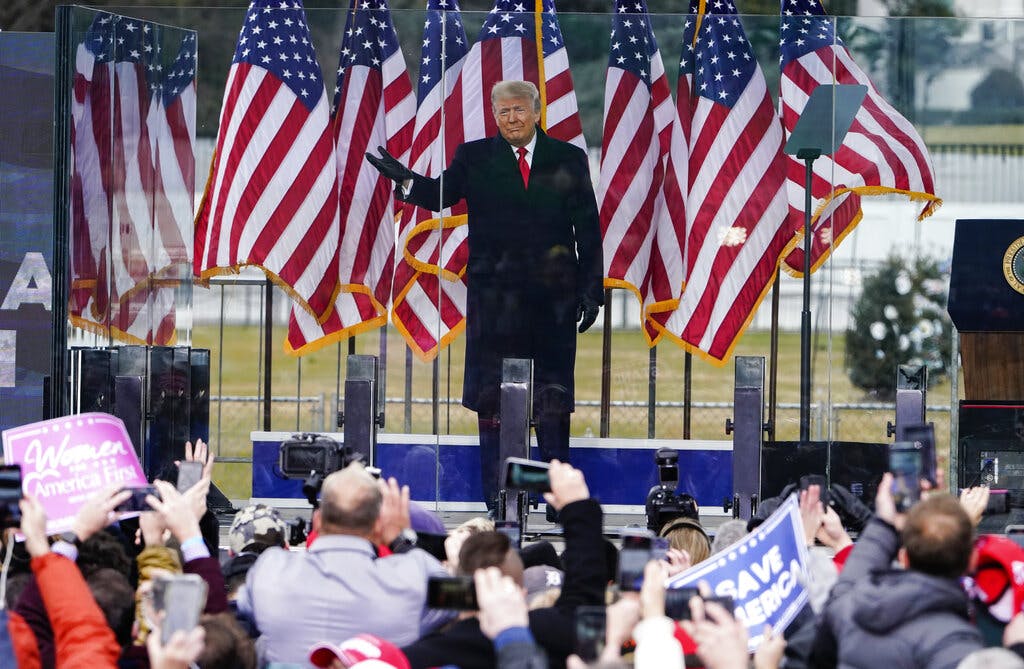How Tough Is Trump’s Legal Teflon?
Judges weigh the scope of the former president’s J6 immunity.

Can the leader of the free world be held to account in a civil lawsuit? That is the question in federal courts at the District of Columbia, as jurists weigh President Trump’s legal vulnerability in civil litigation over the events of January 6, 2021.
The issue of presidential immunity is emerging from a barrage of civil suits filed by Democrats in Congress and Capitol police officers seeking to hold Mr. Trump responsible for the damages that ensued from the rioting. Mr. Trump argues that not only is he not factually culpable, but that the office he held functioned as an absolute shield to civil litigation.
That question was one taken up earlier this year by a district court judge, Amit Mehta. His oleaginous opinion begins in a major key; “violence and disruption happened in other countries, but not here. This is the United States of America, and it could never happen to our democracy.”
Violence did transpire, however, and the group of congressmen and police officers turned to the Ku Klux Klan Act of 1871 for redress. That statute aims to hold civilly accountable those who “conspire to prevent, by force, intimidation, or threat, any person” from holding office or discharging their official duties.
The key Supreme Court precedent is a 1981 case, Nixon v. Fitzgerald. There, a former federal employee, Arthur Fitzgerald, sued President Nixon and other officials for damages that flowed from his being fired. Fitzgerald alleged that the cause of his termination was disclosing cost overruns in the Air Force, information he shared while testifying to Congress.
The high court reversed two lower court rulings to hold that a “former President of the United States, is entitled to absolute immunity from damages liability predicated on his official acts,” meaning that Nixon could not be held liable for firing Fitzgerald.
The 5-to-4 holding, with a decision written by Justice Lewis Powell, ruled that this immunity was a “functionally mandated incident of the President’s unique office, rooted in the constitutional tradition of the separation of powers,” and a reflection of the president’s “unique position in the constitutional scheme.”
While other federal officials enjoy qualified, or partial, immunity, the justices found that the “diversion” of the president’s “energies by concern with private lawsuits would raise unique risks to the effective functioning of government.” The president, after all, is the sole officer constitutionally held responsible for ensuring that the “laws are faithfully executed.”
The court cited the “sheer prominence”* of the president’s office, which makes him “an easily identifiable target for suits for civil damages,” as another reason to extend complete protection over his performance “within the ‘outer perimeter’ of his official responsibility.” In Judge Mehta’s words, this protection is “unquestionably capacious, though not categorical.”
For the judge, this species of absolute immunity is not one enjoyed by Mr. Trump in regard to the suit at hand because there is “no constitutional provision or federal statute that grants or vests in the President (or the Executive Branch) any power or duty with respect to the Certification of the Electoral College vote.”
Judge Mehta acknowledged that a “first-term President is, in a sense, always a candidate for office,” but held that his speech on January 6 was not “spoken in furtherance of a presidential function.” Instead, the “main thrust of the Speech was not focused on policy or legislation,” but on a quest to remain in office.
Acknowledging — improbably — that the “court well understands the gravity of its decision,” Judge Mehta nevertheless held that Mr. Trump is not shielded from civil immunity due to the “unofficial acts” that are “without precedent” when it comes to a chief executive.
On appeal, Judge Mehta’s decision was this week the subject of fierce argument in front of three riders of the Court Appeals for the District of Columbia; Judith Rogers, Gregory Katsas, and Sri Srinivasan.
Mr. Trump’s attorney, Jesse Binnall, argued that the Founders intended impeachment, not a lawsuit, to be the recourse for restraining an unlawful president. Mr. Trump was acquitted by the Senate of a single article of incitement to insurrection.
Mr. Binnall observed that the president’s use of the “bully pulpit” was intrinsic to his role, and that commanders in chief often comment on matters only tangentially related to enumerated powers, like Supreme Court decisions.
Mr. Binnall refused to concede that what one jurist called a “colorable case of incitement” was justification for piercing presidential immunity, nor would he agree that behavior aimed at “crippling the other branches of government,” in one rider’s parlance, justified holding that Mr. Trump is vulnerable to suit.
The attorney for the plaintiffs, Joseph Sellers, took a different position. He argued that speech that “overtly, explicitly or implicitly” suborned insurrection could not then avail itself of the protection afforded by Fitgerald to the execution of “official duties.” For him, Mr. Trump’s actions “subverted our constitutional design” and thus “lack any valid claim to immunity.”
________
* All of the powers granted by the Constitution in Article II, which creates the executive branch, are vested personally in the president.

